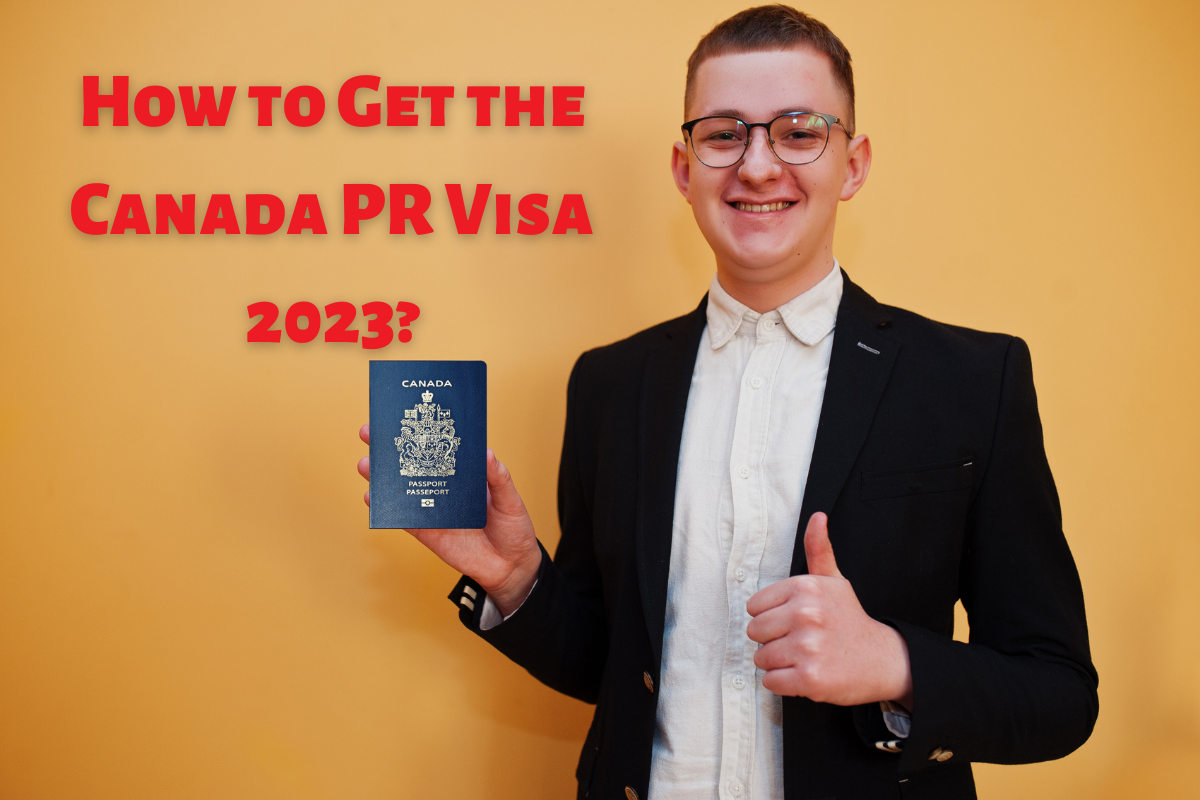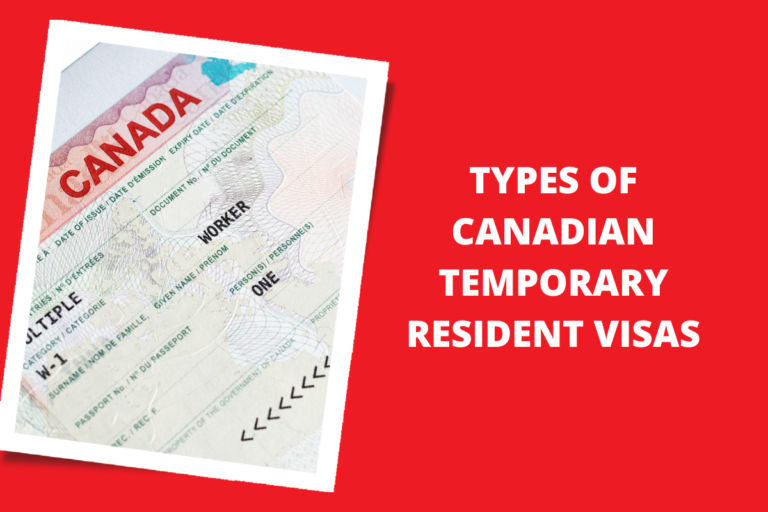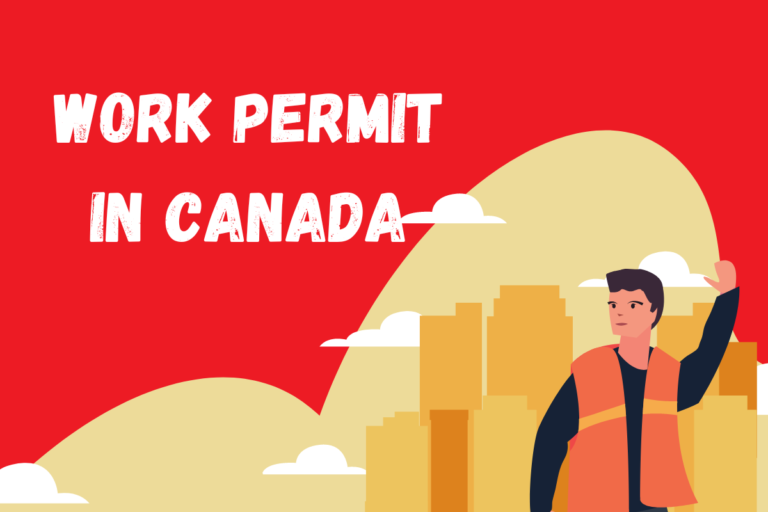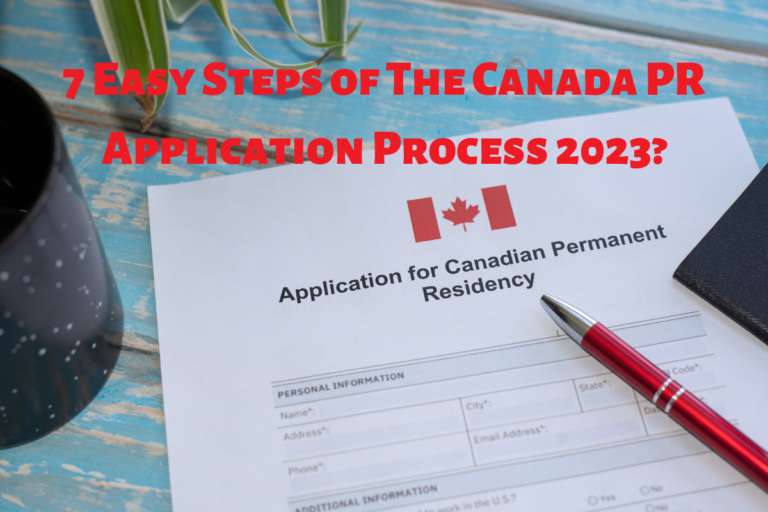How to Get the Canada PR Visa 2023?
Step-By-Step To Get the Canada PR Visa
To obtain a Permanent Resident (PR) Visa for Canada, you need to follow these steps:
- Determine your eligibility: Canada has several immigration programs, and you need to determine which one you qualify for. The most popular options are the Federal Skilled Worker Program (FSWP), Canadian Experience Class (CEC), and Provincial Nominee Program (PNP).
- Complete an Express Entry profile: If you are eligible for the FSWP or CEC, you need to create an Express Entry profile on the Canadian government’s website. You will be asked to provide information about your education, work experience, language proficiency, and other details.
- Obtain an Invitation to Apply (ITA): The Canadian government conducts regular Express Entry draws, where they invite candidates with the highest scores to apply for PR. If you receive an ITA, you have 90 days to submit a complete PR application.
- Submit your PR application: You need to provide all the necessary documents, including police clearance certificates, educational credentials, and language test results. You also need to pay the application fees.
- Attend a medical exam: You need to undergo a medical exam to ensure that you meet Canada’s health requirements.
- Wait for a decision: The Canadian government will review your application and make a decision on whether to grant you PR status. The processing time can vary depending on the program you apply for and other factors.
- Land in Canada: Once you receive your PR visa, you need to land in Canada before the expiry date. You will then receive your PR card, which you need to renew every five years.
Note that the process for obtaining a PR visa for Canada can be complex, and it’s advisable to consult with an immigration lawyer or a licensed immigration consultant for guidance.
3 popular ways to get through the Canada PR process
There are several ways to obtain a Canada PR visa, but three popular ways to get through the process are:
- Express Entry System: The Express Entry system is a point-based system that manages applications for the Federal Skilled Worker Program (FSWP), Canadian Experience Class (CEC), and Provincial Nominee Program (PNP). It evaluates candidates based on factors such as age, education, work experience, language proficiency, and adaptability. The highest-scoring candidates receive an Invitation to Apply (ITA) for PR.
- Provincial Nominee Program (PNP): The PNP is a program that allows provinces and territories to nominate individuals who have the skills and experience they need. Each province and territory has its own PNP streams, which have different eligibility requirements. If you are nominated by a province or territory, you can apply for PR through the Express Entry system or a paper-based process.
- Family Sponsorship: If you have a close relative who is a Canadian citizen or permanent resident, they may be able to sponsor you for PR. The sponsor must meet certain income requirements, and you must meet eligibility requirements such as health and criminality checks. The Family Sponsorship program allows spouses, common-law partners, dependent children, parents, and grandparents to apply for PR.
It’s important to note that the eligibility criteria, application process, and processing times vary for each program. Therefore, it’s advisable to research each option carefully and seek professional advice before applying.
Eligibility for Canada PR
To be eligible for a Canada PR visa, you must meet certain requirements, including:
- Language Proficiency: You must prove your proficiency in English or French by taking a language test approved by the Canadian government. The required level of proficiency depends on the immigration program you apply for.
- Educational Qualification: You must have a Canadian high school diploma or a foreign education credential that is equivalent to a Canadian high school diploma. If you have a foreign education credential, you must provide an Educational Credential Assessment (ECA) report to show that your education is equivalent to a Canadian education.
- Work Experience: You must have at least one year of skilled work experience in a National Occupational Classification (NOC) code at skill levels 0, A, or B.
- Age: There is no age limit to apply for a Canada PR visa, but younger applicants may score higher points in the Express Entry system.
- Adaptability: You must show that you are likely to settle and integrate successfully into Canadian society. Factors that are considered include your spouse’s education, previous work or study in Canada, and family or friends in Canada.
- Medical and Security Clearance: You must undergo a medical examination and provide a police clearance certificate to prove that you are in good health and have no criminal history.
- Financial Support: You must show that you have enough money to support yourself and your family in Canada. The amount required depends on the size of your family.
It’s important to note that the eligibility criteria vary for each immigration program, and meeting the minimum requirements does not guarantee that you will be selected for a Canada PR visa. Therefore, it’s advisable to seek professional advice before applying.
Documentation
To apply for a Canada PR visa, you will need to provide various documents, including:
- Language Test Results: You must provide language test results for English or French. The test results must be from a designated testing organization approved by the Canadian government.
- Educational Credential Assessment (ECA) Report: If you have a foreign education credential, you must provide an ECA report to show that your education is equivalent to Canadian education.
- Work Experience Documents: You must provide documents to prove your work experiences, such as reference letters from previous employers, job descriptions, and pay stubs.
- Passport or Travel Document: You must have a valid passport or travel document.
- Police Clearance Certificate: You must provide a police clearance certificate from each country where you have lived for more than six months since the age of 18.
- Medical Examination: You must undergo a medical examination by a panel physician approved by the Canadian government.
- Proof of Financial Support: You must show that you have enough money to support yourself and your family in Canada. The amount required depends on the size of your family.
- Other Supporting Documents: Depending on the immigration program you apply for, you may need to provide additional documents such as marriage certificates, birth certificates, and proof of education or work experience.
It’s important to note that the required documents vary for each immigration program, and the Canadian government may request additional documents or information during the application process. Therefore, it’s advisable to consult with an immigration lawyer or a licensed immigration consultant for guidance on the documentation required for your specific situation.
Application Process
The application process for a Canada PR visa depends on the immigration program you apply for. Here are the general steps for the most popular immigration programs:
-
Express Entry System:
- Create an Express Entry profile and provide information about your age, education, work experience, language proficiency, and adaptability.
- Receive a Comprehensive Ranking System (CRS) score based on the information provided.
- If you meet the minimum CRS score for the latest draw, you will receive an Invitation to Apply (ITA) for PR.
- Submit an online application for PR within 90 days of receiving the ITA.
- Provide supporting documents, such as language test results, educational credential assessment reports, work experience documents, police clearance certificates, medical examination reports, and proof of financial support.
- Pay the application fee and wait for the application to be processed.
-
Provincial Nominee Program (PNP):
- Check the eligibility requirements for the PNP stream in the province or territory where you want to live.
- Apply to the PNP stream and wait for the province or territory to nominate you.
- If you are nominated, you will receive a Notification of Interest (NOI) or a Provincial Nomination Certificate.
- Create an Express Entry profile or submit a paper-based application for PR, depending on the PNP stream requirements.
- Provide supporting documents and pay the application fee.
- Wait for the application to be processed.
-
Family Sponsorship:
- The sponsor must apply to sponsor you and be approved by Immigration, Refugees, and Citizenship Canada (IRCC).
- Once the sponsor is approved, you can apply for PR.
- Provide supporting documents, such as language test results, educational credential assessment reports, work experience documents, police clearance certificates, medical examination reports, and proof of financial support.
- Pay the application fee and wait for the application to be processed.
It’s important to note that the processing time varies for each immigration program and can take several months or even years. Therefore, it’s advisable to consult with an immigration lawyer or a licensed immigration consultant for guidance on the application process and to ensure that your application is complete and accurate.
Cost
The cost of a Canada PR visa depends on the immigration program you apply for and the number of family members included in the application. Here are some of the fees you may need to pay:
-
Express Entry System:
- Application Processing Fee: CAD $825 per adult applicant, CAD $225 per dependent child.
- Right of Permanent Residence Fee: CAD $500 per adult applicant.
-
Provincial Nominee Program (PNP):
- Application Processing Fee: Varies depending on the province or territory.
- Right of Permanent Residence Fee: CAD $500 per adult applicant.
-
Family Sponsorship:
- Sponsorship Application Fee: CAD $75.
- Principal Applicant Processing Fee: CAD $825 per adult applicant, CAD $225 per dependent child.
- Right of Permanent Residence Fee: CAD $500 per adult applicant.
Other fees that you may need to pay include language test fees, educational credential assessment fees, police clearance certificate fees, and medical examination fees. Additionally, you may need to pay fees for a lawyer or an immigration consultant to assist with your application.
It’s important to note that the fees are subject to change, and you should check the latest fee schedule on the official website of Immigration, Refugees, and Citizenship Canada (IRCC) before submitting your application. Additionally, the Canadian government may request additional fees or charges during the application process, such as biometric fees or courier fees. Therefore, it’s advisable to budget for additional expenses and to seek professional advice on the cost of your specific situation.
Processing Time
The processing time for a Canada PR visa depends on the immigration program you apply for and the completeness of your application. Here are the estimated processing times for some of the most popular immigration programs:
-
Express
Entry System:
- Federal Skilled Worker Program: 6 to 8 months.
- Federal Skilled Trades Program: 4 to 6 months.
- Canadian Experience Class: 6 months.
-
Provincial Nominee Program (PNP):
- Varies depending on the province or territory and the stream you apply for. Processing times can range from 6 months to 2 years.
-
Family Sponsorship:
- Spousal Sponsorship: 12 to 17 months.
- Parent and Grandparent Sponsorship: 20 to 24 months.
It’s important to note that the processing times are only estimates and can vary depending on the volume of applications received the complexity of the application and the need for additional information or documentation. Additionally, the processing time can be longer if your application requires additional screening or security checks.
You can check the latest processing times on the official website of Immigration, Refugees, and Citizenship Canada (IRCC). It’s advisable to plan ahead and apply as early as possible to allow enough time for processing and avoid any delays in your plans to move to Canada.




